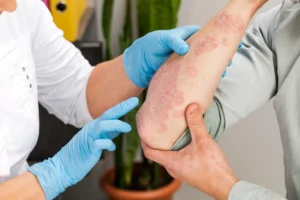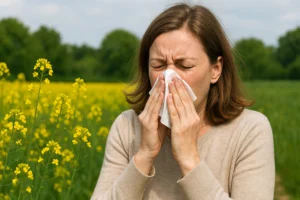Table of Contents
As parents, watching children play outdoors is often a joyous experience. However, for some, the fun in the mud can quickly turn into a skin problem, as a sudden eczema flare-up appears on their child’s face. You’re not alone if your child experiences dry, red patches after playing outside, especially in the dirt or mud. Understanding why this happens can help you protect your child’s skin and manage eczema more effectively.
What Is Eczema?
Eczema, or atopic dermatitis, is a chronic skin condition characterized by red, inflamed, and itchy patches. It commonly affects children and can appear anywhere on the body, including the face. Eczema on the face can be particularly troublesome, as it causes discomfort and can lead to self-esteem issues in children.
Why Does Eczema Flare After Playing in Mud?
There are several reasons why children develop eczema on their faces after playing in mud.
- Allergic Reactions: Mud, especially in outdoor environments, often contains allergens like pollen, mold, and dust mites. These elements can trigger an allergic reaction in children with sensitive skin or pre-existing allergies, leading to eczema flare-ups. Eczema often worsens when the skin comes in contact with an irritant, and playing in dirt may expose the skin to these potential allergens.
- Moisture and Bacteria: Mud contains water and microorganisms that, when left on the skin, can disrupt the skin’s natural barrier. Being particularly sensitive, the face is more prone to developing eczema symptoms, such as dryness and irritation, when exposed to these factors.
- Genetic Factors: Children predisposed to eczema due to family history or other environmental factors are more likely to experience flare-ups after exposure to external irritants like mud. Their immune system may overreact, causing inflammation and a visible eczema rash.
Eczema Symptoms to Watch For
Facial eczema symptoms in children are easy to spot and often appear quickly after playing in mud or exposure to allergens. Some common symptoms include:
- Red, inflamed skin: This is one of the most noticeable signs of an eczema rash.
- Dry, scaly patches: Often, the skin will become rough and dry.
- Intense itching: Itching can be exceptionally bothersome for children, sometimes causing them to scratch, which can worsen the condition.
- Swelling or crusting: In more severe cases, eczema can lead to swelling, blisters, or even skin infections if left untreated.
Can Eczema Spread?
Parents often wonder if eczema can spread from one part of the body to another. While eczema doesn’t spread in the traditional sense, flare-ups can occur in new areas, significantly if the skin barrier is compromised. For example, a child who gets eczema on their hands from playing in mud may later experience symptoms on their face if exposed to the same irritants.
Can Eczema Be Cured?
While there is no permanent cure for eczema, the good news is that it can be managed effectively with the right treatment plan. Many children “outgrow” eczema as they get older, but for some, it remains a chronic condition that requires ongoing care. Treatment is critical to controlling symptoms and reducing flare-ups.
Eczema Treatment Options
If your child experiences facial eczema after playing in mud or being exposed to outdoor irritants, several eczema treatment options are available. These include:
- Topical Steroids: These are often prescribed to reduce inflammation and soothe itching. However, they must be used with caution, especially on the face.
- Moisturizers: Keeping the skin hydrated is essential for managing eczema. Look for thick, fragrance-free moisturizers that help restore the skin’s barrier.
- Avoiding Triggers: Identifying and avoiding eczema triggers, such as allergens in mud, can prevent flare-ups. It is crucial to keep your child’s face clean after outdoor play.
- Sublingual Allergy Drops: Sublingual allergy drops may offer relief for children with eczema linked to allergies. These drops retrain the immune system to tolerate allergens over time, providing a long-term solution for allergic reactions that contribute to eczema flare-ups.
Facial Eczema Treatment Tips
Managing eczema on the face requires a delicate balance. Children’s skin is more sensitive than adults, especially on the face, so it’s important to follow these tips:
- Gentle Cleansing: After outdoor play, wash your child’s face with a mild, fragrance-free cleanser to remove mud and potential allergens.
- Moisturize Regularly: Apply a good moisturizer immediately after washing the face to lock in moisture and prevent dryness.
- Use Sun Protection: If your child is prone to eczema on the face, using a gentle sunscreen can help protect the skin from further irritation caused by sun exposure.
Can Eczema Go Away?
Eczema can improve over time, especially in children. Many children see their symptoms lessen or even disappear as they grow older. However, there is no guarantee that eczema will completely go away. For some children, it can become a long-term condition that requires consistent management and treatment.
Eczema Medication
If your child’s persistent eczema persists, a doctor may recommend topical corticosteroids or other treatments that help manage inflammation. In more severe cases, oral medications may be necessary to control eczema symptoms and prevent infection.
What Does Eczema Look Like?
Facial eczema often appears as red, dry patches that may look scaly or rough. If scratched repeatedly, the skin can crack, bleed, or become infected. It’s essential to recognize the signs of eczema early so treatment can be started promptly, preventing the condition from worsening.
Protect Your Child’s Skin Today
If your child is experiencing eczema on their face after playing in the mud, it’s important to address the problem quickly to avoid further discomfort. While several over-the-counter treatments are available, professional help can ensure your child’s eczema is managed effectively and prevent flare-ups from becoming recurring.
Protect your child’s skin today by contacting a specialist who can tailor a treatment plan for your child’s unique needs.
At AllergenIQ, we specialize in treating eczema and related allergic conditions using cutting-edge therapies like sublingual allergy drops. Our experts will help your child regain control over their skin health and experience long-term relief.











